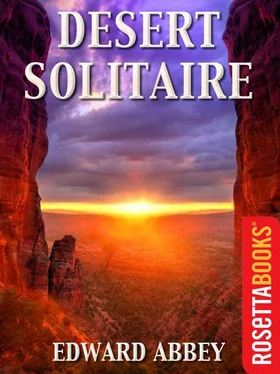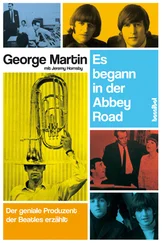Abbey, Edward - Desert Solitaire (Edward Abbey Series )
Здесь есть возможность читать онлайн «Abbey, Edward - Desert Solitaire (Edward Abbey Series )» — ознакомительный отрывок электронной книги совершенно бесплатно, а после прочтения отрывка купить полную версию. В некоторых случаях можно слушать аудио, скачать через торрент в формате fb2 и присутствует краткое содержание. Год выпуска: 2011, Издательство: RosettaBooks, Жанр: Старинная литература, на английском языке. Описание произведения, (предисловие) а так же отзывы посетителей доступны на портале библиотеки ЛибКат.
- Название:Desert Solitaire (Edward Abbey Series )
- Автор:
- Издательство:RosettaBooks
- Жанр:
- Год:2011
- ISBN:нет данных
- Рейтинг книги:4 / 5. Голосов: 1
-
Избранное:Добавить в избранное
- Отзывы:
-
Ваша оценка:
- 80
- 1
- 2
- 3
- 4
- 5
Desert Solitaire (Edward Abbey Series ): краткое содержание, описание и аннотация
Предлагаем к чтению аннотацию, описание, краткое содержание или предисловие (зависит от того, что написал сам автор книги «Desert Solitaire (Edward Abbey Series )»). Если вы не нашли необходимую информацию о книге — напишите в комментариях, мы постараемся отыскать её.
Desert Solitaire (Edward Abbey Series ) — читать онлайн ознакомительный отрывок
Ниже представлен текст книги, разбитый по страницам. Система сохранения места последней прочитанной страницы, позволяет с удобством читать онлайн бесплатно книгу «Desert Solitaire (Edward Abbey Series )», без необходимости каждый раз заново искать на чём Вы остановились. Поставьте закладку, и сможете в любой момент перейти на страницу, на которой закончили чтение.
Интервал:
Закладка:
2. Most of them have been working alone; the presence of a jostling crowd is therefore not a familiar irritation to be borne with resignation but rather an unaccustomed pleasure to be enjoyed.
3. Most of them are making good wages and/or doing work they like to do; they are, you might say, happy. (The boom will not last, of course, but this is forgotten. And the ethical and political implications of uranium exploitation are simply unknown in these parts.)
4. The nature of their work requires a combination of skills and knowledge, good health and self-reliance, which tends to inspire self-confidence; they need not doubt their manhood. (Again, everything is subject to change.)
5. Finally, Moab is a Mormon town with funny ways. Hard booze is not sold across the bar except in the semiprivate “clubs.” Nor even standard beer. These hard-drinking fellows whom I wish to praise are trying to get drunk on three-point-two! They rise somewhat heavily from their chairs and barstools and tramp, with frequency and a squelchy, sodden noise, toward the pissoirs at the back of the room, more waterlogged than intoxicated.
In the end the beer halls of Moab, like all others, become to me depressing places. After a few games of rotation pool with my friend Viviano Jacquez, a reformed sheepherder turned dude wrangler (a dubious reform), I am glad to leave the last of those smoky dens around midnight and to climb into my pickup and take the long drive north and east back to the silent rock, the unbounded space and the sweet clean air of my outpost in the Arches.
Yes, it’s a good job. On the rare occasions when I peer into the future for more than a few days I can foresee myself returning here for season after season, year after year, indefinitely. And why not? What better sinecure could a man with small needs, infinite desires, and philosophic pretensions ask for? The better part of each year in the wilderness and the winters in some complementary, equally agreeable environment—Hoboken perhaps, or Tiajuana, Nogales, Juarez… one of the border towns. Maybe Tonopah, a good tough Nevada mining town with legal prostitution, or possibly Oakland or even New Orleans—some place grimy, cheap (since I’d be living on unemployment insurance), decayed, hopelessly corrupt. I idle away hours dreaming of the wonderful winter to come, of the chocolate-colored mistress I’ll have to rub my back, the journal spread open between two tall candles in massive silver candlesticks, the scrambled eggs with green chile, the crock of homebrew fermenting quietly in the corner, etc., the nights of desperate laughter with brave young comrades, burning billboards, and defacing public institutions.… Romantic dreams, romantic dreams.
For there is a cloud on my horizon. A small dark cloud no bigger than my hand. Its name is Progress.
The ease and relative freedom of this lovely job at Arches follow from the comparative absence of the motorized tourists, who stay away by the millions. And they stay away because of the unpaved entrance road, the unflushable toilets in the campgrounds, and the fact that most of them have never even heard of Arches National Monument. (Could there be a more genuine testimonial to its beauty and integrity?) All this must change.
I’d been warned. On the very first day Merle and Floyd had mentioned something about developments, improvements, a sinister Master Plan. Thinking that they were the dreamers, I paid little heed and had soon forgotten the whole ridiculous business. But only a few days ago something happened which shook me out of my pleasant apathy.
I was sitting out back on my 33,000-acre terrace, shoeless and shirtless, scratching my toes in the sand and sipping on a tall iced drink, watching the flow of evening over the desert. Prime time: the sun very low in the west, the birds coming back to life, the shadows rolling for miles over rock and sand to the very base of the brilliant mountains. I had a small fire going near the table—not for heat or light but for the fragrance of the juniper and the ritual appeal of the clear flames. For symbolic reasons. For ceremony. When I heard a faint sound over my shoulder I looked and saw a file of deer watching from fifty yards away, three does and a velvet-horned buck, all dark against the sundown sky. They began to move. I whistled and they stopped again, staring at me. “Come on over,” I said, “have a drink.” They declined, moving off with casual, unhurried grace, quiet as phantoms, and disappeared beyond the rise. Smiling, thoroughly at peace, I turned back to my drink, the little fire, the subtle transformations of the immense landscape before me. On the program: rise of the full moon.
It was then I heard the discordant note, the snarling whine of a jeep in low range and four-wheel-drive, coming from an unexpected direction, from the vicinity of the old foot and horse trail that leads from Balanced Rock down toward Courthouse Wash and on to park headquarters near Moab. The jeep came in sight from beyond some bluffs, turned onto the dirt road, and came up the hill toward the entrance station. Now operating a motor vehicle of any kind on the trails of a national park is strictly forbidden, a nasty bureaucratic regulation which I heartily support. My bosom swelled with the righteous indignation of a cop: by God, I thought, I’m going to write these sons of bitches a ticket. I put down the drink and strode to the housetrailer to get my badge.
Long before I could find the shirt with the badge on it, however, or the ticket book, or my shoes or my park ranger hat, the jeep turned in at my driveway and came right up to the door of the trailer. It was a gray jeep with a U.S. Government decal on the side—Bureau of Public Roads—and covered with dust. Two empty water bags flapped at the bumper. Inside were three sunburned men in twill britches and engineering boots, and a pile of equipment: transit case, tripod, survey rod, bundles of wooden stakes. ( Oh no! ) The men got out, dripping with dust, and the driver grinned at me, pointing to his parched open mouth and making horrible gasping noises deep in his throat.
“Okay,” I said, “come on in.”
It was even hotter inside the trailer than outside but I opened the refrigerator and left it open and took out a pitcher filled with ice cubes and water. As they passed the pitcher back and forth I got the full and terrible story, confirming the worst of my fears. They were a survey crew, laying out a new road into the Arches.
And when would the road be built? Nobody knew for sure; perhaps in a couple of years, depending on when the Park Service would be able to get the money. The new road—to be paved, of course—would cost somewhere between half a million and one million dollars, depending on the bids, or more than fifty thousand dollars per linear mile. At least enough to pay the salaries of ten park rangers for ten years. Too much money, I suggested—they’ll never go for it back in Washington.
The three men thought that was pretty funny. Don’t worry, they said, this road will be built. I’m worried, I said. Look, the party chief explained, you need this road. He was a pleasant-mannered, soft-spoken civil engineer with an unquestioning dedication to his work. A very dangerous man. Who needs it? I said; we get very few tourists in this park. That’s why you need it, the engineer explained patiently; look, he said, when this road is built you’ll get ten, twenty, thirty times as many tourists in here as you get now. His men nodded in solemn agreement, and he stared at me intently, waiting to see what possible answer I could have to that.
“Have some more water,” I said. I had an answer all right but I was saving it for later. I knew that I was dealing with a madman.
As I type these words, several years after the little episode of the gray jeep and the thirsty engineers, all that was foretold has come to pass. Arches National Monument has been developed. The Master Plan has been fulfilled. Where once a few adventurous people came on weekends to camp for a night or two and enjoy a taste of the primitive and remote, you will now find serpentine streams of baroque automobiles pouring in and out, all through the spring and summer, in numbers that would have seemed fantastic when I worked there: from 3,000 to 30,000 to 300,000 per year, the “visitation,” as they call it, mounts ever upward. The little campgrounds where I used to putter around reading three-day-old newspapers full of lies and watermelon seeds have now been consolidated into one master campground that looks, during the busy season, like a suburban village: elaborate housetrailers of quilted aluminum crowd upon gigantic camper-trucks of Fiberglas and molded plastic; through their windows you will see the blue glow of television and hear the studio laughter of Los Angeles; knobby-kneed oldsters in plaid Bermudas buzz up and down the quaintly curving asphalt road on motorbikes; quarrels break out between campsite neighbors while others gather around their burning charcoal briquettes (ground campfires no longer permitted—not enough wood) to compare electric toothbrushes. The Comfort Stations are there, too, all lit up with electricity, fully equipped inside, though the generator breaks down now and then and the lights go out, or the sewage backs up in the plumbing system (drain fields were laid out in sand over a solid bed of sandstone), and the water supply sometimes fails, since the 3000- foot well can only produce about 5gpm—not always enough to meet the demand. Down at the beginning of the new road, at park headquarters, is the new entrance station and visitor center, where admission fees are collected and where the rangers are going quietly nuts answering the same three basic questions five hundred times a day: (1) Where’s the john? (2) How long’s it take to see this place? (3) Where’s the Coke machine?
Читать дальшеИнтервал:
Закладка:
Похожие книги на «Desert Solitaire (Edward Abbey Series )»
Представляем Вашему вниманию похожие книги на «Desert Solitaire (Edward Abbey Series )» списком для выбора. Мы отобрали схожую по названию и смыслу литературу в надежде предоставить читателям больше вариантов отыскать новые, интересные, ещё непрочитанные произведения.
Обсуждение, отзывы о книге «Desert Solitaire (Edward Abbey Series )» и просто собственные мнения читателей. Оставьте ваши комментарии, напишите, что Вы думаете о произведении, его смысле или главных героях. Укажите что конкретно понравилось, а что нет, и почему Вы так считаете.












